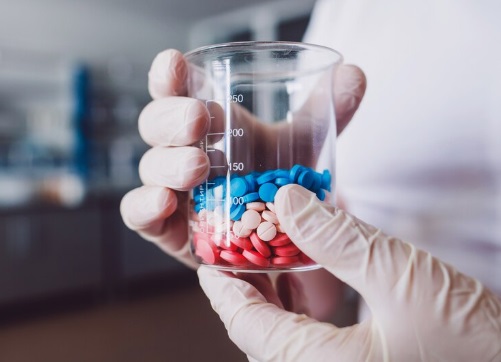Course Description
Fellowship in Clinical Pharmacology is a specialized postgraduate program designed to enhance the knowledge, skills, and clinical expertise of healthcare professionals in the field of pharmacology. Clinical pharmacology, a branch of pharmacology, focuses on the safe, effective, and economical use of medications in patients. This fellowship program serves as an advanced training opportunity, particularly beneficial for medical doctors, pharmacists, and researchers seeking to work at the intersection of drug development, clinical research, and patient care.
Objectives of the Fellowship
The primary aim of a Fellowship in Clinical Pharmacology is to develop professionals who can:
- Understand drug actions, mechanisms, and interactions at a clinical level.
- Participate in drug trials, therapeutic drug monitoring, and pharmacovigilance.
- Make informed decisions on drug therapy based on evidence and patient needs.
- Contribute to the rational use of medicines and policy development.
- Fellows are expected to gain both theoretical and practical knowledge to ensure they can integrate pharmacological principles into clinical settings effectively.
Highlights
- 12 Months of online classes which includes 3-4 months of Clinical Observership in a leading hospital.
- Classes by experienced faculties
- Flexible learning mode
- Live doubt clearing sessions
- Educator support through LMS
- Periodic Webinars
- Associated with UGC & GRADE NAAC A++ University
- Training with Reputed Hospital
What You’ll Learn
- Trainees undergo intensive coursework, hands-on clinical rotations, and research initiatives, frequently partnering with pharmaceutical firms and regulatory bodies. The program prepares fellows to lead clinical trials, refine drug therapies, and advance personalized medicine.
- Graduates pursue impactful careers in academia, industry, or regulation, driving innovation and promoting safe, effective treatments.
- This fellowship empowers participants to connect laboratory discoveries with real-world patient care, improving overall therapeutic success.
Career Opportunities
Graduates of a Clinical Pharmacology Fellowship are well-equipped for various roles across clinical, academic, and regulatory domains. Career paths include:
- Clinical pharmacologist in hospitals or healthcare institutions
- Drug safety or pharmacovigilance specialist
- Clinical research associate or coordinator
- Regulatory affairs expert in pharmaceutical companies
- Academic or teaching faculty in medical and pharmacy colleges
Importance in Modern Healthcare
With the growing emphasis on evidence-based medicine, personalized therapy, and drug safety, the role of clinical pharmacologists is becoming increasingly significant. This fellowship ensures that healthcare professionals are equipped to handle complex therapeutic challenges, assess drug efficacy and safety, and improve overall patient care outcomes.
Fellowship in Clinical Pharmacology not only enhances professional qualifications but also opens up diverse and impactful career avenues. It fosters a deeper understanding of therapeutics, promotes rational drug use, and contributes significantly to advancing healthcare systems.
Course Highlight
Modules Comprehensive modules covering various aspects of nutrition & dietetics.
Assessments Quizzes, assignments to test your knowledge and skills.
Certification Certified Nutritionist credential upon completion.
Key Features
Advanced Specialization
Provides in-depth training in clinical pharmacology, focusing on drug action, interactions, and therapeutic applications. Ideal for medical doctors, pharmacists, and biomedical professionals seeking specialization beyond basic pharmacology.
Practical and Research-Based Training
Hands-on experience in clinical settings, such as: Therapeutic drug monitoring, Participation in clinical trials, Adverse drug reaction reporting
Interdisciplinary Approach
Integrates knowledge from medicine, pharmacy, toxicology, and regulatory science. Encourages collaboration with departments such as internal medicine, pediatrics, oncology, and public health.
Contribution to Public Health
Prepares fellows to support drug policy development, ensure rational medicine use, and promote patient safety at institutional or national levels.
Course Structure
- Drugs as organic molecules
- Interactions between molecules
- Ionization
- Isomers
- Introduction to Mechanisms of Specific and Non-specific Drug Action
- Agonists and antagonists
- Partial Agonists and Inverse Agonists
- Drugs Affecting Transmembrane Signaling
- Nuclear Drug Receptors
- Enzymes as Drug Targets Including Anticholinesterases
- Enzyme Induction and Inhibition
- Unwanted Drug Effects
- Tolerance & Tachyphylaxis
- Drug Interactions
- Introduction to pharmacokinetics and modeling
- Pharmacokinetics principles in different patient groups
- Pharmacokinetics of intravenous anaesthesia
- Absorption and Bioavailability
- Distribution, Protein Binding and Body Compartments
- Inhalational drug administration
- Pharmacokinetics: Elimination
- Drug Metabolism and Excretion
- The Cytochrome P450 system
- Two- and three-compartment models
- Clearance and volume of distribution
- Target controlled infusions
- Interindividual Variation in Drug Response
- Halogenated Volatile Agents and Unwanted Effects of Volatile Agents
- Nitrous oxide and xenon
- Mechanism of General Anaesthetic Action
- Benzodiazepines & Sedative agents
- Propofol
- The Barbiturates
- Etomidate
- Ketamine
- Properties of an ideal intravenous induction agent
- Local Anaesthetic Agents
- Simple analgesia: aspirin and paracetamol
- Non-Steroidal Anti-Inflammatory Drugs (NSAIDs)
- Opioid drugs: general properties and mechanisms of action
- Morphine and other opioids
- Opioids with weak and partial agonist activity and opioid antagonists
- The Neuromuscular Junction & the Nicotinic Acetylcholine Receptor
- Succinylcholine
- Non-depolarizing muscle relaxants: general properties
- Aminosteroid neuromuscular blocking agents
- Benzylisoquinolinium muscle relaxants
- Reversal of neuromuscular blockade
- The ideal short acting muscle relaxant
- The Autonomic nervous system
- Drugs and the Sympathetic Nervous System
- Endogenous catecholamines
- Drugs and the Parasympathetic Nervous System
- The Cardiovascular System and Sites for Drug Effects
- Inotropes and Vasoconstrictors
- Drugs used in Ischaemic heart disease
- Classifications for antiarrhythmic drugs
- Clinical Use of Antiarrhythmic Agents
- Drugs to produce intraoperative hypotension
- Therapeutic Antihypertensives
- Anticoagulants
- Antiplatelet Agents
- Thromboprophylaxis and thrombosis
- Fluids for volume expansion
- Antihistamines
- Drugs acting on the respiratory system
- Drugs used in the treatment of acute asthma
- Drugs acting on the GI tract
- Antiemetic drugs
- Diuretics
- Drugs acting on the uterus
- Principles of actions of antimicrobial drugs
- Antimicrobial Stewardship for Community Pharmacy
- Antimicrobial drugs
- Antifungal and antiviral drugs
- Antiepileptic drugs (AEDs)
- Antidepressants/drugs affecting mood
- Anti-Diabetic Therapy: NIDDM & Insulin Therapy in Diabetes Mellitus
- Corticosteroids; Thyroxine and Drugs Used in Thyroid Disorders
- Effects of Drugs on the Eye and Vision; Includes Intraocular Pressure
- Social drugs: Alcohol
- Social drugs: Non-legal Drugs
- Social drugs: Tobacco
- Managing sepsis
- Prudent use of antibiotics (part 1)
- Prudent use of antibiotics (part 2)
- Prudent use of antibiotics (part 3)
- Safe prescribing in renal impairment
- Safe Use of Insulin
- Symptom management for the dying adult
- Drug management of breathlessness
- Drug management of pain: core knowledge
- Management of constipation
- Management of nausea and vomiting
- Management of seizures
- IV anaesthetic agents
- Inhalational anaesthetic agents
- Neuromuscular blocking agents
- Local Anaesthetic Agents
- Drugs Used in an Emergency
Eligibility
- MBBS or equivalent medical degree
- BPharm/MPharm/PharmD degrees
- Postgraduates in biomedical or life sciences
Course Fee
Course Fee ₹160,000.00
Registration Fee ₹10,000.00
Total Fee ₹140,000.00

Dr. Arshan Ali
MBBS(MAMC)|MDAnaesthesia &Critical Care (LHMC) | EDAIC Senior Resident– Anaesthesiology, Lady Hardinge Medical College & Hospital Member - EDAIC– European Diploma in Anaesthesiology and Intensive Care (ESAIC) Member - Indian Society of AnaesthesiologistsWhy Choose Us
Because your growth deserves nothing but the best in medical education.

Expert-Driven Curriculum
Our program is designed in collaboration with leading healthcare professionals to ensure you receive the most up-to-date and relevant education.

Flexible Learning Environment
Access course materials online anytime, allowing you to balance your studies with your professional and personal commitments.

Comprehensive Support
Benefit from continuous support from experienced tutors and academic advisors dedicated to your success

Interactive Learning
Engage with a variety of interactive learning tools, including real-life case studies, practical assignments, and virtual simulations.

Networking Opportunities
Connect with a diverse community of learners and professionals, providing valuable networking opportunities and peer support

Affordable Education
We offer competitive pricing with flexible payment plans and financial aid options to make your education more accessible.

Recognized Certification
Obtain a certification that is respected and recognized in the healthcare industry, enhancing your professional credentials and career prospects

Career Support
Beyond education, we provide comprehensive career guidance, job placement assistance guarantee, and ongoing professional development support.
What Our Alumni Are Saying
Discover How MedJoin Global Healthcare Is Transforming Careers Worldwide.
Frequently Asked Questions
Fellowship in Clinical Pharmacology is a postgraduate program designed to provide advanced training in the safe, effective, and rational use of medicines. It covers drug action, interactions, clinical trial management, pharmacovigilance, and personalized medicine.
Yes, many institutions offer online or hybrid options, making it accessible to working professionals or those in different geographic locations.
Graduates can pursue careers as:
- Clinical pharmacologists in hospitals or health systems
- Drug safety and pharmacovigilance officers
- Clinical research associates (CRA) or coordinators
- Regulatory affairs specialists
- Academicians or faculty in medical/pharmacy colleges
- Professionals in pharmaceutical companies and public health agencies
Yes, most programs include hands-on training in clinical trials, protocol design, data analysis, and adverse drug reaction (ADR) reporting. Fellows often participate in active research projects.
You will develop skills in:
- Drug evaluation and evidence-based prescribing
- Adverse drug reaction monitoring and reporting
- Conducting and managing clinical trials
- Interpreting pharmacokinetic and pharmacodynamic data
- Regulatory documentation and ethics in clinical research
Yes
With rising concerns about drug safety, antimicrobial resistance, and personalized therapy, clinical pharmacologists play a critical role in ensuring safe, rational, and effective medication use. This fellowship prepares professionals to meet these growing healthcare needs.





